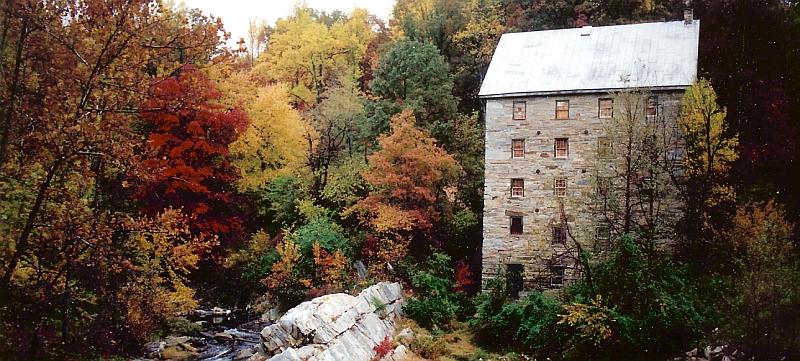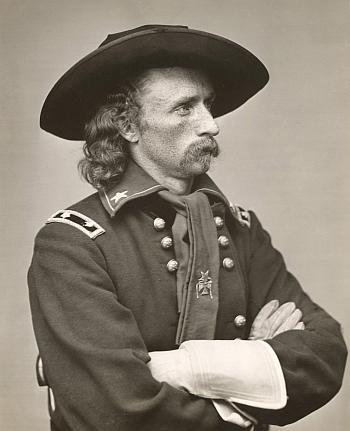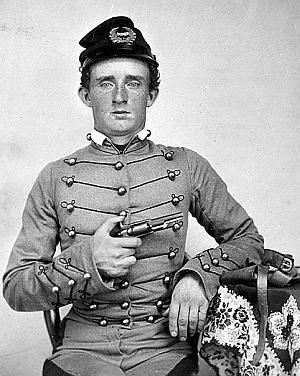

George Armstrong CusterBy Kellie Lemon Rodman
George Armstrong Custer is probably most well-known for dying. He most likely did not intend for that to be the case. He was very ambitious, with a charismatic personality, fearless, and reckless. He was one of the youngest Generals in the Civil War - a Union General at age 23. But his recklessness cost him his life at age 36. Born in New Rumley, Ohio on December 5th, 1839, George Armstrong Custer was the 3rd child of Emanuel and Maria (Ward Kirpatrick) Custer, but the first one of theirs to survive infancy. While his parents called him Armstrong, he referred to himself as "Autie." For four years, he was the baby of the family, spoiled and pampered by his parents and his 5 older step-siblings. His parents had 4 additional children after he was born. Autie spent hours observing his blacksmith father discuss politics and pound horseshoes. He learned to ride bareback. Fascinated with the militia, he played in uniform with a toy musket and sword. Although intelligent, he ignored his lessons at school. He was sent to live with his married half-sister Lydia in Monroe, Michigan, south of Detroit. After 3 years, he returned to Ohio, finished school, and taught in Cadiz. At almost 6 feet tall, with piercing blue eyes, and curly golden yellow hair, he was a desired companion at parties and dances. He sought and received an appointment to West Point, entering the Academy in June, 1857 as part of the Class of 1862. He continued to be a poor student but was one of the most popular. He was loud, energetic, and constantly in trouble. Autie received 151 demerits in one year! He liked to take unnecessary risks. (Students were expelled for 200 demerits.) During leave from West Point in the summer of 1859, he was diagnosed with gonorrhea and hospitalized for treatment. This appears to have left him unable to have children. After Abraham Lincoln was elected in 1860, southern cadets, including his best friend Tom Rosser, began to leave the Academy as their states seceded from the Union. (Later, Custer's wife Libbie wrote in her memoirs, "My husband told me that he loved West Point better than any place on earth, that his happiest days had been spent there and his only sad ones were when his Southern classmates were watching for their states to secede during the winter of '61.") 
It was decided that Autie's class should graduate one year earlier in June, 1861. After one month of instruction that substituted for their entire 5th year, Autie Custer graduated. (He almost didn't graduate! He was arrested and court-martialed for encouraging a fight. But there was such a need for new officers that charges were dropped.) July 21st, 1861, just three days out of West Point, Custer and Company G, 2nd Cavalry were part of the Union battle line near a creek called Bull Run, near Manassas, VA. But a sudden attack by Confederates on Henry Hill sent the Union troops fleeing toward Washington, D.C., ending the First Battle of Manassas, or Bull Run. On the Peninsular Campaign, Custer did reconnaissance from a silk balloon, operated by Professor Thaddeus Lowe. He was rewarded for bravery at New Bridge by a promotion to Brevet Captain. McClellan said of Custer, "Custer was simply a reckless, gallant boy. . . unconscious of fear." While on leave on Thanksgiving, 1862, he met the lovely 20 yr. old Elizabeth "Libbie" Bacon in Monroe, Michigan. She was smitten with him and he was determined to marry her. As part of the staff of Brig. General Alfred Pleasonton of the 1st Cavalry Division, Custer led counterattacks that freed Union troops from J.E.B. Stuart's Confederate Cavalry at Brandy Station, VA on June 9th, 1863 in the largest cavalry battle of the war. Using his saber to cut his way out of action with the enemy at Aldie, VA on Jun 17th, 1863, he later bragged, "I was surrounded by rebels and cut off from my own men, but I made my way out safely." Perhaps he thought his plan would always work when he was surrounded. The ambitious Custer was promoted in to Brigadier General at 23 years of age. He was one of the youngest generals in the Union Army. He was given command of the 2nd Brigade of the 3rd Cavalry Division, called the Michigan Brigade. He nicknamed it the "Wolverine Brigade." During the Battle of Gettysburg, Custer led a brash attack that routed Stuart's cavalry. Pursuing the retreating Confederates, the Michigan Brigade took 1500 prisoners in Falling Waters, MD. The newspapers called him the "boy General with the golden locks". But his troops called him "Old Curly." His hair was long and hung in curls as if he were a girl. He had vowed not to cut it until the Union entered Richmond. Late July found Custer awaiting orders at Warrenton (VA) Junction. He was troubled by a new problem. John S. Mosby, formerly of Jeb Stuart's staff, had set up a partisan band that threatened the Union troops. Custer organized 300 men to hunt for them, but Mosby's men would just disappear into the local population. While on furlough after being wounded near Culpeper, VA in September, 1863, he proposed to Libbie Bacon and she accepted. Custer then returned east. On October 18th, the golden yellow curls beneath Custer's hat bounced as he traveled down the Warrenton Turnpike (Route 29) from Groveton toward Buckland, Virginia. That night Custer and his men bivouacked in Gainesville, 12 miles north of Warrenton. The men were so sure that the Confederates were close by that they slept with their guns in hand. Custer was aware that the Confederates had reoccupied Chapman's Mill, just six miles away. But he wasn't aware that Lee was ready to march his troops down the mill road (Beverley Mill Road) toward the Warrenton Turnpike and New Baltimore. On October 19th, 1863 Custer's troops skirmished down the turnpike for 2 miles, chasing the Confederates. General Kilpatrick and his troops followed. The Confederates were strongly positioned on the south side of Broad Run (creek) at Buckland's Mill with well-placed artillery. Having tried unsuccessfully to move them directly, he turned their left flank and was able to force them south about one mile. Custer's men stopped to eat supper. Custer then learned that his opposition was J. E. B. Stuart. Stuart, he was told, had been eating supper when Custer arrived and was forced to abandon his food mid-meal. Here General Kilpatrick and his brigade took the lead. Custer stated that he had warned them that the Confederate "retreat" might be a trick. Soon he heard gunshots. Suddenly, Custer was informed that Confederate forces were advancing on him down Vint Hill Road (Rt. 215) from Greenwich, Virginia. Pennington's Union artillery continued firing on the enemy until they were just 20 yards away. The Union column was trapped and Kilpatrick's brigade was stuck in dozens of places. Pennington barely escaped with his cannons. Major Clarke, the 5th Michigan Cavalry was separated from his regiment with one battalion. When the others crossed to the north side of Broad Run, he and some of his men were captured. Custer and the other Union forces dashed off to Gainesville so quickly that this battle became known as the "Buckland Races." Custer reported that 214 men were killed, wounded, or missing. (162 were listed as missing.) He was dismayed to learn that the Confederate forces were not only J.E.B. Stuart's men, but those of Fitzhugh Lee, and his old friend Tom Rosser. On February 9, 1864 Custer and Libbie were married in the First Presbyterian Church in Monroe, Michigan. Custer served in the battles at Charlottesville, the Wilderness, and Winchester. One of his troopers mortally wounded Stuart in May. In October at Tom's Brook near Woodstock, he rode out and scouted Tom Rosser's Confederate line, while saluting his old friend. On October 19th at Cedar Creek near Middletown, VA, Custer and the Union defeated Confederate Jubal Early. Custer was allowed to go to Washington and present the flags to the Secretary of War Edwin M. Stanton on October 23rd. He was promoted to Major General. Custer witnessed Lee's surrender at Appomattox Court House in the home of Wilmer McLean (formerly of Manassas). General Sheridan bought the table on which the surrender was signed for $20 from McLean and presented it as a gift to Libbie Custer. After the Civil War ended, Custer went west with the 7th Cavalry in 1866. After a disastrous campaign in Indian Territory in 1867, he was suspended one year without pay. He began writing for magazines and thoroughly enjoyed the celebrity that provided. Custer died with his 225 men in the Battle of Little Bighorn in Montana on June 25th, 1876, when he entered into battle with 3,000 Sioux and Cheyenne warriors. He had ignored orders in another reckless action. His death was blamed on the Indians. However, his wounds leave room for doubt. He was buried in West Point, NY on October 10, 1877. His widow Libbie spent her life writing and building the legend of the man she loved until her death on April 14th, 1933. She is buried beside him at West Point. |
|
|
First posted Aug 30, 2009, Last update Jan 25, 2020 |